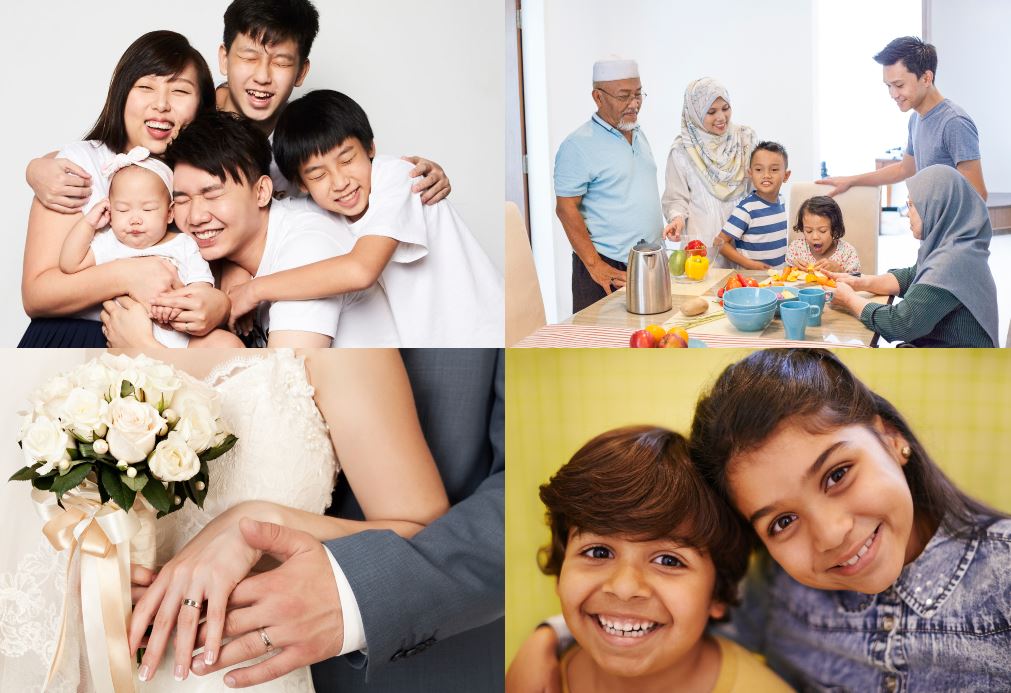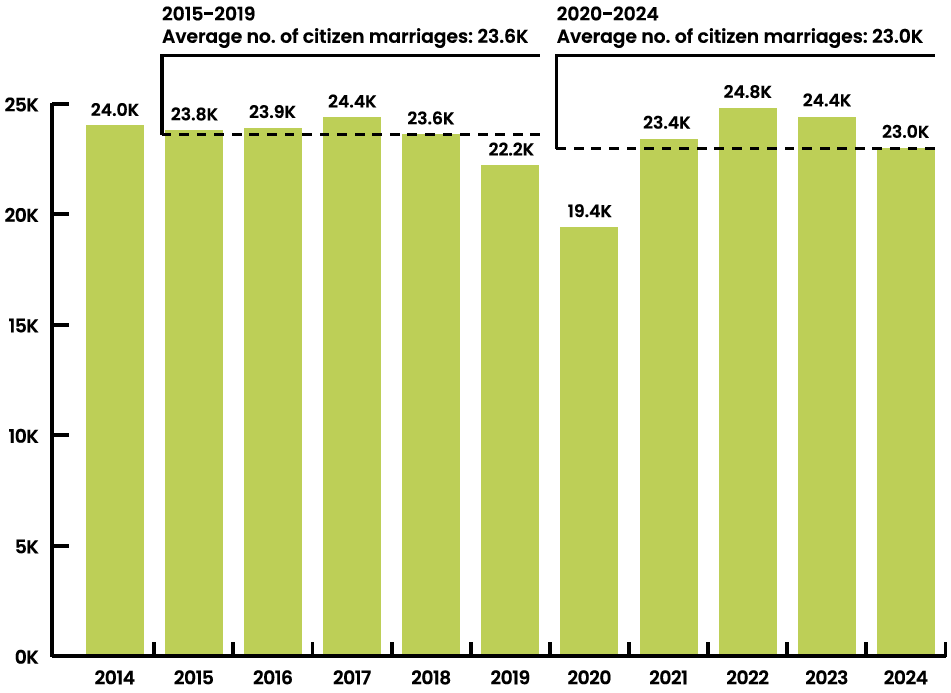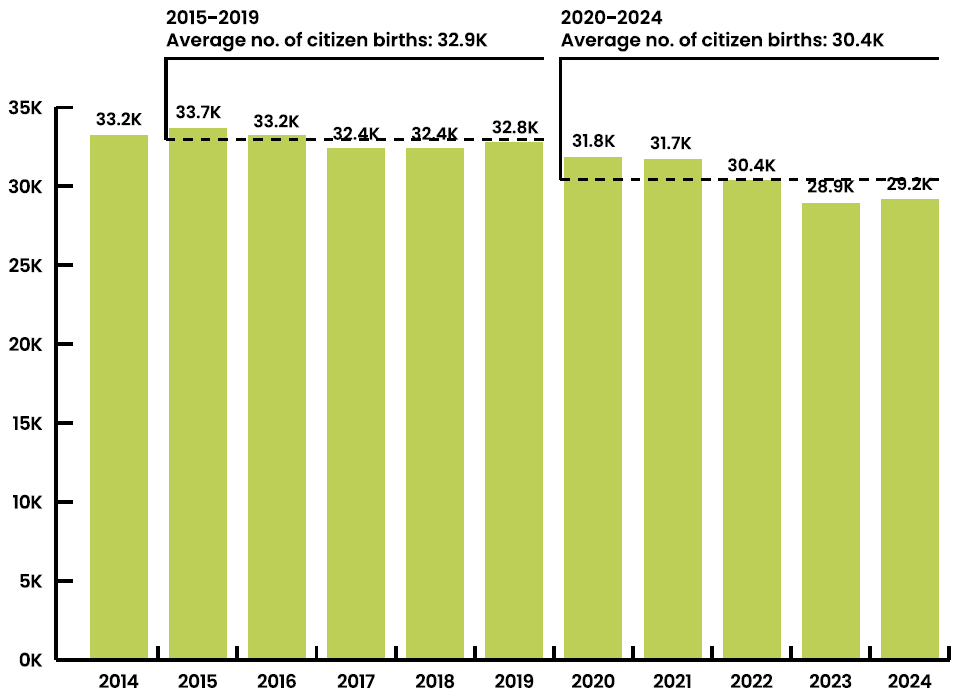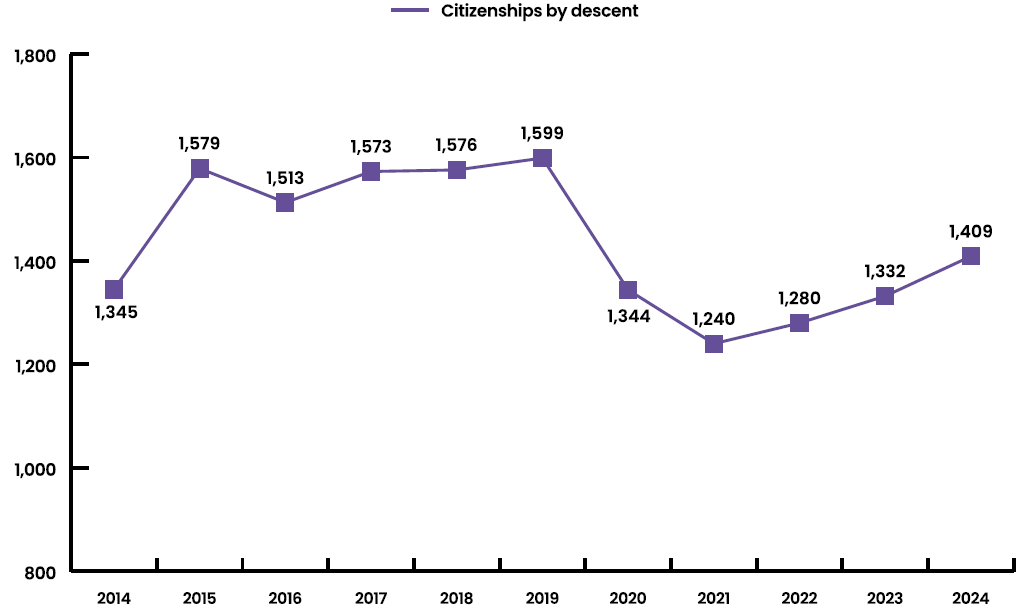Marriage & Parenthood

Marriage and Parenthood Trends
There were 22,955 citizen marriages in 2024, 5.7% lower than the 24,355 citizen marriages in 2023, but higher than the 22,165 citizen marriages in 2019 (pre-COVID) (Chart 3)[1].
The average number of citizen marriages per year in the last five years (23,000) was lower than that of the preceding five years (23,600). The median age at first marriage for citizen grooms and brides was 30.8 and 29.1 years in 2024, up from 30.1 and 27.9 years respectively in 2014.
Chart 3: Citizen marriages

Source: Department of Statistics
The figures are based on the full calendar year (January to December).
There were 29,237 citizen births in 2024, 1.2% more than the 28,877 citizen
births in 2023 (Chart 4)[2]. The average number of births per
year in the last five years (30,400) was lower than in the preceding five
years (32,900).
Chart 4: Citizen births

Source: Immigration & Checkpoints Authority
The figures are based on the full calendar year (January to December).
The resident total fertility rate (TFR), which has been declining over the past few decades, was 0.97 in 2024, unchanged from 2023[3]. Many other advanced societies are also experiencing falling birth rates, as more people are postponing family formation and having fewer children, as they prioritise other life goals.
In addition to citizen births in Singapore, there are also children born overseas to at least one Singaporean parents. In 2024, 1,409 children born overseas to at least one Singaporean parents were granted citizenship by descent (Chart 5)[4].
Chart 5: Number of children granted citizenships by descent

Source: Immigration & Checkpoints Authority
The figures are based on the full calendar year (January to December).
Support for Marriage & Parenthood
Marriage and parenthood are ultimately personal decisions, influenced by a variety of factors including changing social norms and personal priorities. Our approach has been to foster an environment where Singaporeans continue to aspire towards marriage and parenthood, and are supported to start, raise and grow their families.
Young Singaporeans have consistently expressed a strong desire to get married and have children. From our 2021 Marriage & Parenthood survey, 8 in 10 young singles aspire to get married and have children, and over 9 in 10 married Singaporeans want at least two children. These sentiments have remained relatively stable since our surveys in 2012 and 2016.
Supporting Singaporeans to fulfil their aspirations to marry and have children continues to be our priority. Through close partnerships across Government agencies, and with community partners, employers, businesses and the broader society, a range of support is available to Singaporeans at every stage of their marriage and parenthood journey. The Marriage & Parenthood Package provides comprehensive support to help couples start and raise their families. Key measures in the Package include:
-
Priority housing schemes and grants to help couples own their first home
-
Healthcare schemes to defray the costs of assisted conception, maternity and newborn care
-
Financial support through the Baby Bonus scheme, comprising a Cash Gift, First Step Grant and Government co-matching contributions to the Child Development Account
-
Large Families Scheme to provide additional support to couples with three or more children
-
MediSave Grant for Newborns to defray children’s healthcare expenses
-
Government-Paid Parental Leave schemes including Maternity Leave, Paternity Leave, Shared Parental Leave and Childcare Leave
-
Subsidised infant care and childcare services
The Government continually reviews and enhances our marriage and parenthood support in response to feedback gleaned through our surveys and engagements.
For example, to help parents manage the costs of child-raising, the Baby Bonus Scheme has been progressively enhanced over the years, and most recently at Budget 2023.
In addition, we have strengthened measures to help parents manage their work and family commitments. Since 1 January 2024, Unpaid Infant Care Leave was doubled from 6 to 12 days per parent per year. Since 1 April 2025, to encourage greater shared parental responsibility, mandatory Government-Paid Paternity Leave (GPPL) was increased to four weeks, and the new Shared Parental Leave (SPL) Scheme was also introduced, on top of parents’ maternity and paternity leave entitlements. The new SPL will be implemented in two phases, starting with 6 weeks of paid parental leave to be shared between both parents, for parents of babies born from 1 April 2025, and increasing to 10 weeks for parents of babies born from 1 April 2026.
Apart from legislated leave provisions, the Tripartite Guidelines on Flexible Work Arrangement Requests (TG-FWAR), which came into effect on 1 December 2024, requires employers to properly consider employees’ formal Flexible Work Arrangement (FWA) requests, and encourage both sides to have constructive discussions to work out FWAs that are mutually beneficial. The Tripartite Standards on Work-Life Harmony and Unpaid Leave for Unexpected Care Needs were also established in 2021 and 2018 respectively, to highlight good employment practices that all employers are recommended to implement at their workplace.
The Government also introduced the Large Families Scheme (LFS) in 2025 to strengthen support for couples with three or more children. Under the LFS, couples will receive up to $16,000 of additional support for each third or subsequent Singapore Citizen (SC) child born on or after 18 February 2025.
More details on all the support measures can be found at go.gov.sg/mpbooklet and madeforfamilies.gov.sg. Parents may also use the Family Support Calculator in the LifeSG app, to find out how much benefits they can receive.
Beyond these, we must all do our part to ensure that Singapore is a great place to start and raise families. The Made For Families initiative was launched in June 2020 to further assure families of support from the Government and the broader society, and to encourage more businesses and community groups to play a part in building a family-friendly environment.

[1] Citizen marriages refer to marriages involving at least one citizen.
[2] Citizen births refer to babies born to at least one citizen parent.
[3] Total fertility rate refers to the average number of live-births each female would have during her reproductive years (15-49 years old) if she were subject to the prevailing age-specific fertility rates in the population in the given year.
[4] Children under the age of 21 years old and were born overseas to Singaporean parents may be granted citizenship by descent if they meet the prevailing criteria. Citizenship by descent is based on a constitutional entitlement to citizenship for children born overseas to at least one Singaporean parent, akin to how children born in Singapore to at least one Singaporean parent are constitutionally entitled to citizenship by birth. From 2025, to more accurately reflect immigration inflows and birth statistics, citizenships by descent is reported under the Marriage & Parenthood section of our website. Under the People & Society section of our website, the figures for total number of citizenships granted exclude the category of citizenships by descent.

